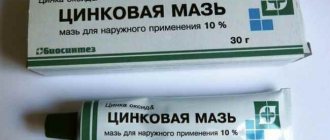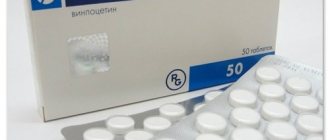Today everyone knows that the cause of endless colds and exacerbations of chronic infections of the upper respiratory tract, bronchi and lungs is poor immunity.
Those who have encountered such problems probably had to use one or another means from the category of immunocorrectors, which includes the drug that will be discussed in this article - Cycloferon.
Information about a medicine is never too much
How good is this medicine? Does it really help? What adverse reactions can it cause? Is Cycloferon harmful for children, and at what age can it be used to treat a child?
Here are just some of the questions that most often concern people searching the Internet for information about the drug Cycloferon. Such searches can only be welcomed: a person’s desire to consciously approach the process of treating their illnesses is reasonable and correct.
At the same time, with regard to Cycloferon, the only correct decision will be only one, which you must come to by studying reviews posted online on forums and the contents of the instructions for use: the decision to prescribe the drug, as well as the method of treatment and dose, must be determined by a specialist - a doctor -immunologist
>>We recommend: if you are interested in effective methods of getting rid of chronic runny nose, pharyngitis, tonsillitis, bronchitis and persistent colds, then be sure to check out this page of the site after reading this article. The information is based on the author’s personal experience and has helped many people, we hope it will help you too. Now let's return to the article.<<
A visit to an immunologist is mandatory!
Only if this medicine is prescribed by a doctor, and not just a therapist, but an immunologist, the likelihood of its successful use is very high, and the risk of adverse reactions is minimal.
When the drug Cycloferon is prescribed simply by a general practitioner or pediatrician (this is possible in the absence of an immunologist in district clinics), the results of treatment or prevention (and the medicine can be used to prevent viral infections - influenza, hepatitis, etc.) may be far from expected .
Remember: no matter in what form the attending physician prescribes Cycloferon to you or your child - tablets, injections or ointment - it is strictly not recommended to use the medicine without the recommendation of an immunologist.
And not because Cycloferon is more dangerous than other drugs, not at all, although this drug is by no means harmless.
A full examination by a competent doctor before using Cycloferon is necessary because only in this case it is possible to determine with a high degree of probability
- To what extent is the use of Cycloferon indicated in your case?
- what can he really change in your condition,
- whether these changes will be what you expect.
In addition, an immunologist, and only he, will be able to create a regimen for taking Cycloferon tablets that is suitable for you or your child or prescribe a course of injections if he deems it necessary.
Indications for use
What does Cycloferon help with? The drug is prescribed for the following diseases (tablets):
- herpes virus;
- neuroinfections;
- influenza and acute respiratory infections;
- acute intestinal infections;
- secondary immunodeficiency due to the influence of fungal and bacterial infections;
- viral hepatitis C and B in chronic form;
- HIV infection (stage 2A-3B).
For children, the drug is prescribed only by a doctor as part of a comprehensive treatment. Indications:
- herpes virus;
- viral hepatitis C and B in acute and chronic form;
- HIV infection (stage 2A-3B);
- acute intestinal infections;
- Acute respiratory infections, influenza.
Cycloferon injections intramuscularly are prescribed only to adults:
- Viral hepatitis C, A, D and B;
- HIV infection (clinical stage 2A-3B);
- lupus erythematosus, rheumatoid arthritis;
- neuroinfections;
- cytomegalovirus, herpetic infections;
- manifestations of secondary immunodeficiency, which is associated with exposure to fungal and bacterial infections;
- diseases of joints of degenerative-dystrophic type;
- chlamydial infections.
Local use of Cycloferon is indicated in the following cases:
- herpes;
- urethritis, balanoposthitis;
- bacterial vaginitis, nonspecific vaginosis.
Why do you need this article?
The purpose of this article is not to prescribe or cancel treatment with Cycloferon prescribed to you. However, it may well be that after visiting the doctor you still have questions and doubts. But the manufacturer’s annotation cannot help you decide how useful and safe Cycloferon is - it’s written too cleverly.
Therefore, we will try to describe in simple and accessible language the principle of operation of the medicine. And, thereby, prevent unpleasant surprises that may arise if it is used incorrectly and thoughtlessly, as well as if the doctor’s recommendations or manufacturer’s instructions are not followed.
First, let's figure out what the drug Cycloferon is, and when its use can really come in handy.
Why Cycloferon and Viferon are not analogues
Acridoneacetic acid penetrates into the cell, acting at the level of the cell nucleus and the surrounding liquid substance - the cytoplasm. In this case, the formation of all three types of human interferons is stimulated, including early interferons (p-interferons). It is the human body’s own interferons that are responsible for the therapeutic effect that the medicine has.
That is, in comparison with Viferon, Genferon and other drugs of a similar composition, Cycloferon is not a product of bioengineering and does not contain foreign proteins.
As a result, the use of Cycloferon is not accompanied by side effects characteristic of drugs containing recombinant (obtained artificially) interferon proteins: flu-like reactions, depressive states, diarrhea, etc.
However, this does not mean that Cycloferon has no side effects at all.
What are interferons and how do they work in our body?
Interferons produced in the tissues of the body under the influence of acridoneacetic acid are responsible for the triple effect of the drug Cycloferon - anti-inflammatory, antiviral and immunomodulatory.
In this case, alpha- and p-interferons have an antiviral effect, and gamma interferon helps to normalize immunity.
It is gamma interferon that “works” most actively in the body of a patient with exacerbation of chronic diseases of the bronchi and lungs, the development of which is caused not by viruses, but by bacteria.
And alpha and beta interferons actively resist all kinds of viruses, including the influenza virus and other viruses that cause the first symptoms of a cold in humans - runny nose, sore throat, etc.
You can see the working diagram of Cycloferon specifically in the figure above.
ARVI, bronchitis and pneumonia are far from the only areas of application of Cycloferon
All of you, of course, know well that in our body viruses cause not only the common cold, but also such serious diseases in their course and consequences as viral hepatitis, cytomegalovirus infection, herpetic lesions of various organs and tissues, HIV infection, etc. d.
Our defenders alpha and beta interferons can successfully cope with all these formidable diseases, especially if they “get into action” at the onset of the disease.
Therefore, doctors prescribe cycloferon for herpes - in tablets and injections, as well as externally (5% ointment).
The medicine is widely used in the treatment of AIDS and viral hepatitis in the early stages of the disease - and remarkable results are obtained.
Although Cycloferon does not directly affect bacteria, its ability to increase the body’s defenses and activate T-lymphocytes and killer cells finds a place in treatment regimens for a wide variety of infections caused by typical and atypical bacteria of all types, as well as fungi and protozoa.
As a result, the medicine is used in the treatment of a wide range of gynecological, infectious, immunodeficiency and, conversely, autoimmune diseases, accompanied by attacks by aggressive microorganisms of various types.
How to take Cycloferon tablets correctly?
Cycloferon tablets contain 150 mg of active substance, which are enteric-coated.
Question: why do tablets need this very shell?
Answer. Because in the opposite case, the hydrochloric acid released by the walls of our stomach will react with acridone acetic acid and change its structure.
As a result, the active substance will reach its “place of work,” that is, the small intestine, already in a non-working state.
Therefore, when taking Cycloferon tablets, you should not chew them (not everyone does this, but some people simply do not know how to swallow tablets) and break them into pieces (thus mothers sometimes try to independently reduce the dose of the drug if Cycloferon is prescribed to a child).
Attention! It is necessary to take Cycloferon tablets on an empty stomach!
There is one more important point: unlike the vast majority of other medications that are prescribed during or after meals, Cycloferon must be taken no later than half an hour before meals.
Why is this condition important to comply with?
Everything is explained quite simply if you remember where and how the drug works. We have already mentioned above that acridoneacetic acid stimulates the production of interferons in various organs rich in lymphoid tissue. One of these organs is the small intestine, or more precisely, its mucous membrane.
If Cycloferon tablets are taken according to all the rules and the active substance enters the food-free small intestine in sufficient quantities and unchanged, then the process will be beneficial with a very high degree of probability. But, still, not one hundred percent.
When Cycloferon tablets cannot help?
Useful information: 30+ antiviral drugs: a list of the best and effective remedies for colds, ARVI, flu, herpes
If the mucous membrane of the small intestine is damaged, covered with ulcers or scars, thinned or atrophied, and if normal metabolism is disrupted, then Cycloferon tablets, even taken according to all the rules, will unfortunately be of little use.
Why are the dosage and dosage regimens different and how important is it to follow them?
Cycloferon tablets are used very widely both in the treatment of various viral infections, immune disorders, and for prevention, in particular for the prevention of influenza.
The regimen for taking Cycloferon tablets is different in each specific case. A detailed description of dosage regimens for Cycloferon for various types of disease is described in the instructions for use, however, when prescribing the drug, the doctor can make adjustments.
Be sure to strictly follow its instructions if you want the drug to really help you and the treatment to not cause complications.
Description of the drug
Cycloferon is available in the form of biconvex tablets coated with a yellowish enteric coating. The tablets contain:
- acridone acetic acid – 150 mg,
- meglumine – 146 mg,
- povidone – 7.93 mg,
- calcium stearate – 3.07 mg,
- hypromellose – 2.73 mg,
- polysorbate 80 – 0.27 mg,
- copolymer of methacrylic acid and ethyl acrylate – 23.21 mg,
- propylene glycol – 1.79 mg.
It is used to provide antiviral, immunomodulatory, anti-inflammatory effects in diseases such as:
- flu;
- herpes;
- acute respiratory diseases.
When is the use of Cycloferon injection indicated?
The second dosage form of Cycloferon is a solution for intramuscular or intravenous injection. Available in ampoules of 2 ml, each milliliter contains 125 mg of acridoneacetic acid.
Let us say right away that for diseases of the respiratory tract, Cycloferon in injections is prescribed extremely rarely, mainly for chronic bronchitis and sluggish pneumonia, accompanied by a sharp decrease in immunity. Moreover, it is used in combination with other medications, antibiotics, sulfonamides, vitamins, etc.
More often, generalized herpetic infections, hepatitis and other serious viral diseases are treated with Cycloferon injections.
Use for brain infections and systemic diseases
Due to the ability of acridoneacetic acid to easily overcome the so-called blood-brain barrier, i.e. get directly to the site of action, Cycloferon (injections) is effective in the treatment of meningitis, encephalitis, Lyme disease and other serious infections of the brain and its membranes.
The immunomodulatory activity of Cycloferon in injections is widely used in the complex treatment of AIDS, as well as rheumatoid arthritis, arthrosis deformans, systemic lupus erythematosus and other serious diseases.
Cycloferon in injections, as in tablets, is prescribed according to a scheme in which the dosage and frequency are determined by the type of disease and its intensity.
Can Cycloferon injections be ineffective or ineffective?
This rarely happens. According to available statistics and reviews, Cycloferon injections are very effective and are much easier to tolerate by patients than Viferon injections.
More often, situations arise when the disease relapses after treatment. This is noted, first of all, when treatment was carried out in violation of the schedule or when the patient did not receive the full course of Cycloferon injections.
After all, it’s no secret that people tend to forget about their problems as soon as these problems disappear. Having felt an improvement, some patients “forget” about the injections, miss the scheduled date for administering Cycloferon, or even stop treatment altogether ahead of schedule.
And as a result, problems that disappeared without a trace return very soon, and an indignant message about Cycloferon in injections appears on the forum, something like: “the medicine is no good, at first it seemed to help, and then everything came back.”
Treatment with Cycloferon injections - only according to indications, in strict accordance with the rules and under the supervision of a doctor
Remember, if the doctor considers it necessary to prescribe you Cycloferon in injections intramuscularly or intravenously:
- the course of therapy cannot be interrupted,
- injections must be carried out strictly according to schedule, the dosage must completely coincide with the prescribed one,
- concomitant treatment should also be carried out promptly and completely.
Now let's get back to where we started the conversation. And let us remember once and for all: Cycloferon and any other injectable medications can be used exclusively and only as prescribed by a doctor, and treatment should be carried out under the control of tests and the patient’s well-being.
After all, when any drug is introduced into our body, its reaction to a foreign substance is, in fact, absolutely unpredictable.
And although Cycloferon does not have many direct contraindications and side effects, the medicine is very serious and any “unauthorized” response of the body to the administration of the drug, both immediate and long-term, requires the immediate attention of a specialist, because it can cause very undesirable consequences.
Remember this and be sure to inform your doctor about any changes in your condition that concern you during the course of therapy with Cycloferon injections. His job is to figure out how serious your complaints are.
In what cases is Valtrex prescribed to pregnant women?
Antiviral drugs are prescribed to pregnant women for the treatment of cytomegalovirus or herpetic infections. These infections can cause serious complications for the fetus itself, although this risk is not always present. Only a specialist decides whether or not to prescribe treatment to a pregnant woman, and with which drugs.
Herpetic infection, which is called genital herpes, is caused by the herpes simplex virus type 2 and is considered the most dangerous if a woman first became infected with it while pregnant. The peculiarity of this threat lies in the fact that when the virus first enters, the body does not have time to produce the antibodies necessary for its protection. Therefore, there is a huge possibility that the virus can penetrate through the placenta to the baby and cause an intrauterine infectious disease. However, such an extreme does not always happen, since the placenta can reliably protect the baby from infection, but still, the degree of risk during primary infection is quite significant. Therefore, in such cases, a pregnant woman is prescribed antiviral treatment.
In some cases, when a pregnant woman has a severe decrease in immunity and is infected with genital herpes, relapses of the disease can be observed, which is an indication for prescribing antiviral drugs to the patient.
It also happens differently: there is no intrauterine infection, but the child picks up the infection at the time of birth, therefore, expectant mothers suffering from genital herpes must undergo a thorough examination. Otherwise, if by the end of bearing the baby, a herpes virus was detected on the surface of the mucous membranes of the genital organs, then a CS is prescribed.
Cytomegalovirus infection is caused by cytomegalovirus (CMV), which is a type of herpes virus. This disease occurs in many women with virtually no symptoms, and the pregnant woman is not even aware of her illness. CMV is characterized by the fact that it has the ability to very easily penetrate the placental barrier, thereby infecting the baby in the womb. Pregnant women who have been diagnosed with this virus during examination are prescribed treatment. It is worth emphasizing that not only primary infection with CMV is dangerous for the expectant mother, but the long-term course of the infection also poses a threat to her health, due to the fact that the body’s immunity is very weakened and cannot resist the virus.
Cycloferon - ointment for herpes
The third and last dosage form of the drug is Cycloferon liniment, or, simply, ointment - it’s more familiar and understandable.
Cycloferon ointment 5% is used for herpes and other external manifestations of viral and other infections. More precisely, 5% Cycloferon (ointment) is used exclusively topically for the treatment of herpetic eruptions on the surface of the skin, as well as in gynecological practice for the complex treatment of gonorrhea, trichomoniasis and other specific and nonspecific diseases of the genital tract.
The instructions describe in sufficient detail how to use Cycloferon ointment for herpes and other problems, so we will not dwell on this point.
Why are Cycloferon injections prescribed?
The prescribed medicine helps not only against viral infections. Indications for the use of the drug in the form of a solution are:
- viral hepatitis (A, B, C and D);
- CMV (cytomegalovirus infection);
- Stage 2 of HIV infection;
- immunodeficiency due to bacterial, viral and fungal infections;
- chlamydia;
- HPV infection;
- simple and genital herpes;
- systemic connective tissue diseases (lupus erythematosus, scleroderma, dermatomyositis);
- rheumatoid arthritis;
- diseases of the joints with signs of degeneration and dystrophy (osteoarthritis);
- serous (viral) encephalitis (inflammation of the brain);
- serous meningitis (inflammation of the membranes of the brain);
- Lyme disease (tick-borne borreliosis).
The medicine is widely used for colds, flu and gynecological pathologies.
Who should not be treated with Cycloferon?
Now let's talk about who is contraindicated for treatment with Cycloferon. As mentioned above, there are few direct contraindications for taking the medicine.
Firstly, the drug cannot be used if you are allergic to acridoneacetic acid or any other component of a particular dosage form.
This warning must be taken seriously. And if you are familiar with allergies firsthand, you must begin treatment with extreme caution. This is especially true for Cycloferon injections and, above all, intravenous ones.
How to avoid allergies to Cycloferon injections?
It is best that you receive your first injection in a hospital facility. It’s even better and more correct to do a special analysis and determine how your blood reacts in a test tube to acridoneacetic acid and N-methylglucamine (an auxiliary component of Cycloferon in tablets and injection solution).
By the way, in 5 percent Cycloferon ointment (some are accustomed to calling Cycloferon in this form a gel) there is no N-methylglucamine, so it causes allergic reactions less often than tablets or solution.
Contraindicated for small children!
Considering the fairly high toxicity of the drug, it should not be taken by patients with a decompensated stage of liver cirrhosis. And it is for this same reason that Cycloferon is contraindicated in pregnant women and children under 4 years of age.
Thyroid problems? Treatment is possible only under the supervision of an endocrinologist!
Cycloferon has another very significant limitation: it cannot be used by people with thyroid diseases without constant medical supervision. In this case, the issue of prescribing the medication, its dosage and duration of treatment is decided by an endocrinologist.
If everything is in order, you still need to get tested
If you have been prescribed Cycloferon tablets, and you do not have elevated allergies and everything is fine with the thyroid gland, then you can take them at home, and this is quite normal.
But in this case, the doctor is obliged to first send you for tests: only after assessing the results of the immunogram can a decision be made on prescribing such a serious drug as Cycloferon.
Contraindications and side effects
According to the instructions for use, Cycloferon in the form of tablets and injection solution has the same contraindications for children. This list includes:
- Increased individual sensitivity to some component of the drug.
- Children up to 4 years old.
- Liver cirrhosis in the stage of decompensation.
- The medicine is prescribed with caution for: acute diseases of the gastrointestinal tract and/or esophagus, a history of allergic reactions of any origin.
As a result of non-compliance with the indicated dosage or individual intolerance to the components of the drug, an allergic reaction may occur, which is accompanied by redness, rashes on the skin, itching, fever, etc. In this case, you must immediately inform your doctor and choose an alternative method of treatment.
Reviews will not help you decide whether Cycloferon is beneficial or harmful for children - you need a pediatric immunologist!
Particular attention should be paid to the rules of administration and the doctor’s recommendations if Cycloferon tablets are prescribed to a child.
How much Cycloferon helps children can be judged by the reviews of their parents, but, as we said above, the last thing you should do is rely on messages on forums: the final word should remain with the doctor. And this doctor should be a pediatric immunologist.
Remember that a single dose of the drug depends on the age of the child. From 4 to 7 years old, children are usually prescribed 1 tablet of Cycloferon per day, from 7 to 11 years old, children are prescribed 2 tablets once a day, after 12 years - 3 tablets.
As mentioned above, children should not chew Cycloferon tablets. They must be washed down with water and taken half an hour before meals.
Cycloferon injections for children are prescribed according to a scheme based on body weight, and are carried out in a hospital setting.
Why is the use of Cycloferon according to the regimen a prerequisite for a positive treatment result?
Firstly, because the lymphoid tissue, in which powerful interferons are formed under the influence of Cycloferon, must be given a break.
Secondly, because it is necessary to give a break to the liver, which suffers under the influence of the drug, and to the kidneys, through which the drug is almost completely removed after 24 hours.
And thirdly, because taking Cycloferon orally or parenterally administering it according to a developed scheme allows you to maintain a strictly defined amount of interferons in the blood necessary to solve a specific problem.
In general, it is necessary to understand that if the body’s protective reactions, called immunity, on their own cannot cope with the problem that has arisen, then “spurring them on” from the outside is a double-edged sword. And do not demand from the doctor to prescribe a drug or change the treatment regimen in cases where he considers it premature or simply unnecessary.
Effect of the drug during pregnancy
Bearing a fetus is a process that requires special care on the part of the mother. Gynecologists say that even accidental use of a drug during pregnancy causes a certain risk of developing an anomaly in the unborn child. To avoid undesirable consequences, you should be very careful when taking medications during pregnancy.
The use of Cycloferon by pregnant women is prohibited by the manufacturer . What is the reason for this? When taking the medication, it is possible to use large dosages of the drug, which has an extremely negative effect on the condition of the fetus. Cycloferon has less negative effects during lactation, even if the infant receives a certain amount of the medicine with milk. Cycloferon is also contraindicated when breastfeeding.
However, the instructions clearly indicate that proper studies of the effects of Cycloferon on a child have not been conducted. Therefore, doctors cannot clearly judge whether Cycloferon is harmful or not during pregnancy and lactation. Is Cycloferon safe for pregnant women? This is a question that remains open to this day.
Even if the mother took Cycloferon in early pregnancy, she should not panic. Such a condition will certainly be passed on to the fetus, and this also has an extremely negative effect on its development. If nothing terrible happened while taking the medicine, and all studies confirm that the condition of the fetus is excellent, then you can safely stop worrying about this. The medicine did not cause any extreme harm to the developing baby.
If up to 8 weeks the pregnancy proceeded without pathologies, then the risk of developing pathologies at a later stage of pregnancy is significantly reduced. However, it is still undesirable to take Cycloferon during early pregnancy. The medicinal components of the drug penetrate the placental barrier and into the blood of the fetus. The active medicinal substance of the drug is methylglucamine acridone acetate. It synthesizes the production of interferons. The substance penetrates the cytoplasm and enhances the synthesis of interferon proteins.











